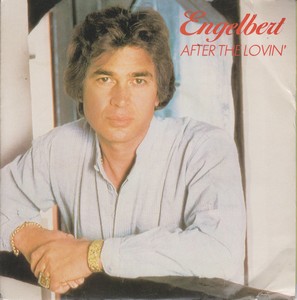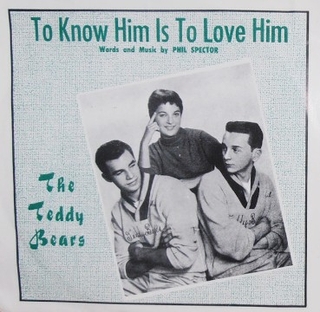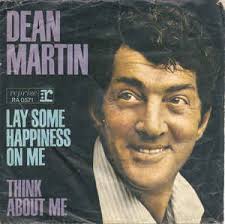Related Research Articles

"After the Lovin'" is a single performed by Engelbert Humperdinck, produced by Joel Diamond and Charlie Calello, and composed by Ritchie Adams with lyrics by Alan Bernstein. The single was a U.S. top-ten hit in late 1976/early 1977, reaching number eight on the Billboard Hot 100 and number five on the Cash Box Top 100. It became a RIAA gold record. It is ranked as the 61st biggest U.S. hit of 1977. The song also reached number 40 on the country singles chart and spent two weeks atop the easy listening chart. It was Humperdinck's final Top 40 Billboard hit.

"To Know Him Is to Love Him" is a song written by Phil Spector, inspired by words on his father's tombstone, "To Know Him Was to Love Him." It was first recorded by the only vocal group of which he was a member, the Teddy Bears. Their recording spent three weeks at No. 1 on the Billboard Hot 100 chart in 1958, while reaching No. 2 on the UK's New Musical Express chart. Peter & Gordon and Bobby Vinton later had hits with the song, with its title and lyrics changed to "To Know You Is to Love You". In 1987, the song was resurrected by Dolly Parton, Linda Ronstadt, and Emmylou Harris, whose Trio recording topped the U.S. country singles chart.

"The Last Waltz" is a ballad, written by Barry Mason and Les Reed. It was one of Engelbert Humperdinck's biggest hits, spending five weeks at number 1 on the UK Singles Chart, from September 1967 to October 1967, and has since sold over 1.17 million copies in the United Kingdom.
"I Will" is a song written by Dick Glasser.
"Am I That Easy to Forget" is a popular song written by country music singer Country Johnny Mathis who later sold the publishing rights to W.S. Stevenson and published in 1958. Belew recorded his song in Nashville on December 17, 1958, and released the single in March 1959, when it reached number nine on the U.S. country music chart. Other country music artists who have recorded cover versions of the song include Skeeter Davis, Ernest Tubb (1960), Jerry Wallace (1962), Gene Vincent (1966), George Jones (1967), Patti Page (1968), Ann-Margret & Lee Hazlewood (1969), Jim Reeves and Prairie Oyster (1991).
"Moon Over Naples" is a 1965 instrumental composed and recorded by German bandleader Bert Kaempfert. The instrumental version reached No. 6 on Billboard's Adult Contemporary chart. It won a BMI Award in 1968.

"Do I Love You" is a song co-written and recorded by Paul Anka, from his 1972 eponymous LP. Released as an advance single in late 1971, "Do I Love You" reached number 14 on the Easy Listening Singles charts of both the U.S. and Canada, number 16 on the Canadian Pop chart, and was a modest hit on the U.S. Hot 100 as well. As with the earlier "My Way", it was adapted from a French-language song popularized by Claude François, and Anka composed the English lyrics.

"I'm Stone in Love with You" is a 1972 single by the Philadelphia soul group The Stylistics. The song is noted for lead singer Russell Thompkins Jr.'s distinctive falsetto singing, which he employs through most of the record. The song was written by Thom Bell, Linda Creed, and Anthony Bell.
"With Pen in Hand" is a song written by Bobby Goldsboro and first released on his March 1968 album, Honey. The song's lyrics address the subjects of divorce and losing custody of one's child, and are sung from the perspective of the parent who expects to be losing custody of their child, as they make a final plea to their spouse to reconcile before the divorce is finalized. "With Pen in Hand" has been a hit for multiple artists in the late 1960 and 1970s.

"Diary" is a song written and produced by David Gates and released by his band Bread in 1972, both as a single and on the album Baby I'm-a Want You.

"Forever" is a song written by Buddy Killen, which was released by The Little Dippers and Billy Walker in January 1960.

"Winter World of Love" is a song recorded by Engelbert Humperdinck, which was released on his eponymous album and as a single in 1969.
"Our Winter Love" is an instrumental composition by Johnny Cowell, which was a hit single for Bill Pursell. Pursell's version was recorded in 1962, and was released as a single in January 1963.
"Somewhere There's a Someone" is a song written by Baker Knight, which was released in 1966 by Dean Martin. The song spent 8 weeks on the Billboard Hot 100 chart, peaking at No. 32, while reaching No. 2 on Billboard's Easy Listening chart. In Canada, the song reached No. 44 on the RPM 100, No. 9 on RPM's "GMP Guide", and No. 17 on the CHUM Hit Parade.
"Come Running Back" is a song written by Dick Glasser, which was released in 1966 by Dean Martin. The song spent 7 weeks on the Billboard Hot 100 chart, peaking at No. 35, while reaching No. 4 on Billboard's Easy Listening chart. In Canada, the song reached No. 74 on the RPM 100 and No. 16 on the CHUM Hit Parade.
"A Million and One" is a song written by Yvonne Devaney, which was a hit single for Billy Walker, Dean Martin, and Vic Dana in 1966.
"Nobody's Baby Again" is a song written by Baker Knight, which was released in 1966 by Dean Martin. The song spent 6 weeks on the Billboard Hot 100 chart, peaking at No. 60, while reaching No. 6 on Billboard's Easy Listening chart. In Canada, the song reached No. 48 on the RPM 100 and No. 17 on the CHUM Hit Parade.

"Lay Some Happiness on Me" is a song that was first released by Eddy Arnold in 1966, on the album Somebody Like Me. The song became a hit in 1967, when it was released by Dean Martin and by Bobby Wright.
"I'm a Better Man" was written by Burt Bacharach and Hal David. It was a hit for Engelbert Humperdinck in 1969. It was a follow-up to the previous release, "The Way It Used To Be".
"The Way It Used to Be" is a song recorded by Engelbert Humperdinck, which was released on the album Engelbert and as a single in 1969. It is an English language adaptation of the Italian language song "Melodia", which was originally released by Isabella Iannetti in 1968.
References
- 1 2 Furia, Philip. "American Song Lyricists, 1920-1960", Gale Group , (2002). p. 455.
- ↑ Engelbert Humperdinck - Too Beautiful to Last, Ultratop. Accessed July 2, 2016.
- ↑ Engelbert Humperdinck - Full Official Chart History, Official Charts Company . Accessed July 1, 2016.
- 1 2 "Billboard Hits of the World", Billboard , June 24, 1972. p. 53. Accessed July 1, 2016.
- 1 2 "Billboard Hits of the World", Billboard , July 1, 1972. p. 49. Accessed July 1, 2016.
- ↑ Song Title Search Results for "Too Beautiful to Last", The Irish Charts. Accessed July 1, 2016.
- ↑ "RPM 100", RPM Weekly , Volume 17, No. 10, April 22, 1972. Accessed July 1, 2016.
- ↑ Engelbert Humperdinck - Chart History - The Hot 100, Billboard.com. Accessed July 1, 2016.
- ↑ Engelbert Humperdinck - Chart History - Adult Contemporary, Billboard.com. Accessed July 1, 2016.
- ↑ "Billboard Top 40 Easy Listening", Billboard , May 13, 1972. p. 34. Accessed July 1, 2016.